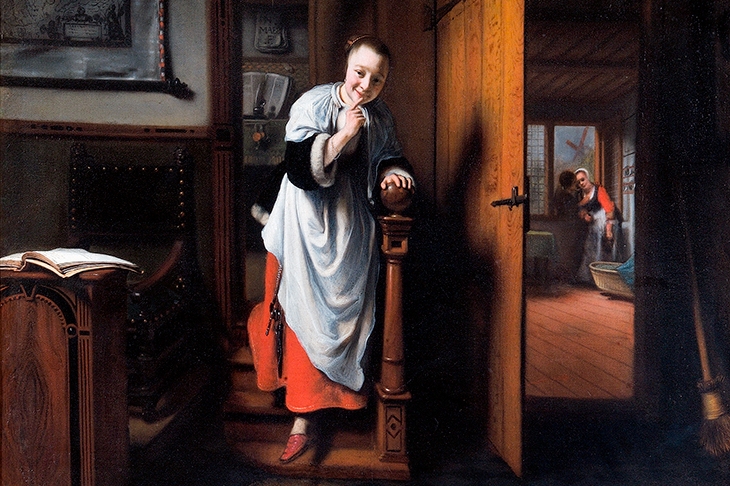Nicolaes Maes (1634–93) relished the simple moments of daily life during the Dutch Golden Age. A woman peeling parsnips over a bowl; a young girl threading a needle; a peasant lugging pails of milk to sell on the doorstep. His paintings are sensitive, not showy, and, as you would expect from a pupil of Rembrandt, rendered with the most exquisite use of light.
Maes was apprenticed to the Dutch master for about five years in his teens. He returned to Amsterdam later in life, but worked for two decades in his hometown of Dordrecht, 11 miles southeast of Rotterdam. Several of his paintings, including ‘The Apostle Thomas’ and ‘Christ Blessing the Children’, have wrongly been attributed to Rembrandt over the years. But there is no mistaking Maes’s genre paintings. These, his strongest works, are entirely sui generis. Though they lack the softness of Rembrandt’s pictures they are every bit as well observed — and often funnier too.
Draw closer and you will spot the maids canoodling with their lovers in the back rooms of the house
As you go round the exhibition at the National Gallery you cannot help but linger over the humorous details. A dog greedily eyes some salmon while his owner chats to a neighbour. A young boy is told off for playing his drum next to a sleeping baby. The floor of ‘The Idle Servant’ is covered in crockery. The girl is supposed to be washing it but has dozed off in her chair. The lady of the house, pointing at her, smiles at us with an amused ‘What is she like?’ expression.
The undisputed highlights of the show are the eavesdropper paintings Maes completed in 1655–7. Most feature cheeky-faced ladies raising their fingers to their lips as if to impart a secret.








Comments
Join the debate for just £1 a month
Be part of the conversation with other Spectator readers by getting your first three months for £3.
UNLOCK ACCESS Just £1 a monthAlready a subscriber? Log in